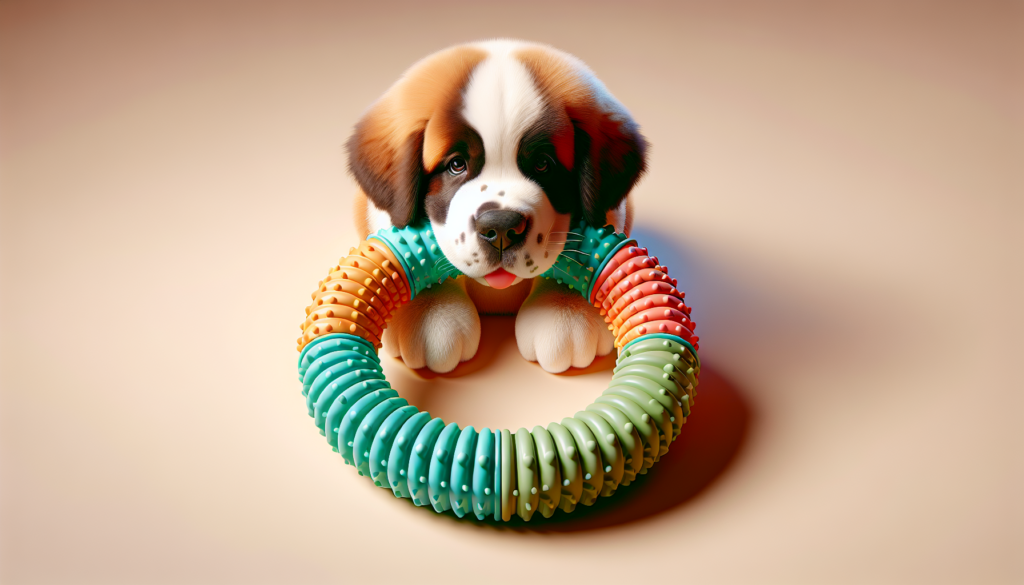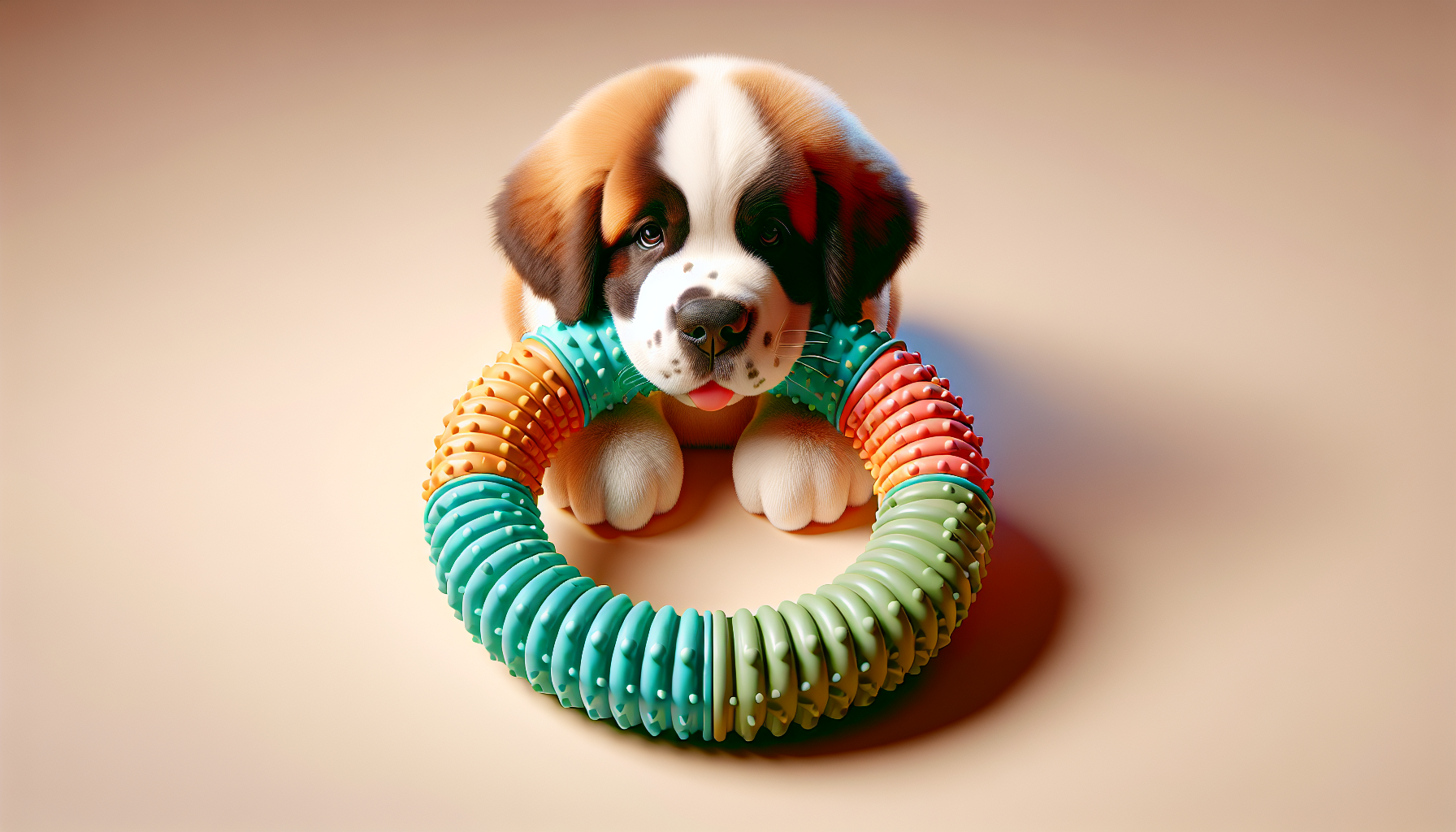If you’re a proud owner of a playful Saint Bernard puppy, you may have encountered the challenge of their biting behavior. While it may seem cute and harmless at first, it’s important to address this behavior early on to prevent it from becoming a problem in the future. In this article, we will explore some effective ways to stop your Saint Bernard puppy from biting, helping you create a peaceful and enjoyable environment for both you and your furry friend.
Understanding Saint Bernard Puppies
Background on Saint Bernard breed
Saint Bernards are large and lovable dogs known for their gentle nature and desire to please their owners. Originally bred in the Swiss Alps for rescue missions, they have since become popular family pets due to their affectionate and sociable personalities. These puppies grow into massive adults, often weighing over 100 pounds. As puppies, they are full of energy and curiosity, which can sometimes lead to unwanted behaviors such as biting.
Understanding puppy behavior
It is important to have a good understanding of puppy behavior in order to effectively address biting issues. Puppies, including Saint Bernards, use their mouths to explore the world around them. This natural behavior helps them learn about their environment, test boundaries, and satisfy their teething discomfort. Young puppies also engage in biting during play, as it is a way for them to interact and learn proper social skills. However, it is crucial to teach them appropriate ways to interact with humans and other animals to prevent biting from becoming a problem.
Causes and Common Triggers
Teething
Teething is a common trigger for biting behavior in puppies. Just like human babies, puppies go through a teething phase where their baby teeth are being replaced by adult teeth. This process can be uncomfortable and painful, leading puppies to chew on anything they can find to alleviate the discomfort. Unfortunately, this may include your hands or furniture. Understanding the underlying cause of their biting can help you address the issue more compassionately and effectively.
Exploration
Puppies use their mouths to explore their surroundings. They may nibble on your fingers, clothes, or shoes out of curiosity and a desire to understand the textures and tastes of different objects. While this behavior is normal, it is important to redirect their attention to appropriate chew toys and discourage them from biting you.
Playfulness
Playfulness is another common trigger for biting in puppies. When puppies play with their littermates, they often engage in nipping and biting as a way to interact and establish their place within the group. As they grow and join their new human family, they may continue to display this playful behavior, which can be perceived as biting. It is essential to teach them appropriate playtime behavior and redirect their biting towards toys.
Attention-seeking
Puppies crave attention, and sometimes resort to biting as a way to get it. They may learn that biting or nipping elicits a reaction from their owners, even if it is negative attention. This reinforcement encourages them to continue the behavior. Teaching them alternative ways to seek attention, such as sitting or giving a paw, can help redirect their desire for interaction.
Fear or anxiety
Puppies may also resort to biting when they feel fearful or anxious. They may perceive a certain situation or stimulus as threatening, triggering a defensive response. It is important to identify the signs of fear or anxiety in your puppy and work on desensitizing them to those triggers through gradual exposure and positive reinforcement training. Seeking professional help from a certified dog trainer or behaviorist can be beneficial in addressing these issues.

Establishing a Safe Environment
Puppy-proofing your home
Creating a safe environment for your Saint Bernard puppy is crucial in preventing unwanted biting behaviors. Puppy-proofing your home involves removing any potential hazards or items that your puppy may chew on. Secure electrical cords, move toxic plants out of reach, and pick up small objects that pose a choking hazard. Keeping your home safe will not only protect your puppy but also discourage them from biting inappropriate items.
Creating a designated puppy area
Designating a specific area for your puppy can help provide them with a safe space to rest and play. This area should be free from hazards and should contain their bed, water bowl, and a variety of appropriate chew toys. Having a designated space for your puppy will allow them to feel secure and minimize the chances of them biting or chewing on things they shouldn’t.
Providing appropriate toys and chew items
To redirect your puppy’s biting behavior, it is important to provide them with appropriate toys and chew items. Look for toys made specifically for teething puppies, as they are designed to soothe their gums and satisfy their chewing needs. Avoid toys with small parts that can be easily chewed off and swallowed. Sturdy rubber toys and Kong-style toys filled with treats can be excellent options to redirect their biting towards safe and satisfying alternatives.
Positive Reinforcement Training
Importance of positive reinforcement
Positive reinforcement training is an effective and humane approach to teaching your Saint Bernard puppy appropriate behavior. This type of training involves rewarding your puppy for displaying desirable behaviors, such as sitting, lying down, or chewing on their toys instead of biting. By using praise, treats, and rewards, you can motivate your puppy to repeat these behaviors, creating a positive association and encouraging them to make the right choices.
Basic obedience training
Basic obedience training is an essential part of raising a well-behaved and non-biting puppy. Teaching commands like “sit,” “stay,” and “leave it” can help redirect your puppy’s attention and prevent them from resorting to biting. Training sessions should be kept short, fun, and positive to keep your puppy engaged and eager to learn.
Using treats and rewards effectively
Treats and rewards are powerful tools in positive reinforcement training. However, it is important to use them effectively to encourage the desired behavior. Use high-value treats that your puppy finds particularly enticing, and provide them immediately after your puppy exhibits the desired behavior. This instant reward will help your puppy associate the behavior with a positive consequence, making them more likely to repeat it in the future.
Consistency in training
Consistency is key when training your Saint Bernard puppy to stop biting. Establish clear rules and expectations for your puppy’s behavior, and ensure that every member of the household follows them consistently. Inconsistency can confuse your puppy and make it difficult for them to understand which behaviors are acceptable and which are not. By being consistent in your training and reinforcement, you can effectively communicate your expectations to your puppy.

Redirecting Behavior
Using redirecting techniques
Redirecting your puppy’s biting behavior involves guiding their attention and redirecting their urge to bite towards appropriate toys or chew items. When you notice your puppy starting to bite, calmly and gently remove your hand or body part from their mouth, and offer them a suitable toy instead. This teaches your puppy what is acceptable to bite and reduces the chances of them redirecting their biting towards you.
Offering an alternative item or toy
Having a variety of chew toys readily available can help redirect your puppy’s biting onto appropriate items. When redirecting their attention, offer them a toy that is similar in texture or shape to what they were attempting to bite. This can help satisfy their needs while also teaching them what is appropriate to chew on.
Distracting with attention and play
Another effective way to redirect your puppy’s biting behavior is by distracting them with attention and play. Engage them in interactive games, such as playing fetch or tug-of-war with their toys. This will not only redirect their energy and focus away from biting but also strengthen the bond between you and your puppy. Remember to reward them with treats and praise when they choose to play with their toys instead of biting.
Socialization and Exposure
Proper socialization techniques
Socializing your Saint Bernard puppy from a young age is essential for their development and to prevent fear or anxiety-related biting. Expose your puppy to a variety of people, animals, and environments in a positive and controlled manner. Gradually increase the level of exposure to different experiences, ensuring your puppy feels safe and comfortable throughout the process. Enrolling in puppy socialization classes can provide structured opportunities for your puppy to interact with others in a controlled setting.
Exposing the puppy to different environments and experiences
Introducing your puppy to different environments and experiences helps them become more confident and adaptable. Take your puppy on walks in the neighborhood, visit parks, and even expose them to car rides. This exposure will help reduce the likelihood of fear or anxiety-related biting, as your puppy learns to navigate new situations with ease.
Introducing the puppy to various people and other animals
It is important to introduce your puppy to a variety of people and animals to ensure they develop proper social skills. Arrange controlled interactions with friends, family members, and other well-behaved dogs. Monitor these interactions closely to prevent any negative experiences that could lead to fear or aggression. Positive experiences with a wide range of individuals and animals will help shape your puppy into a well-rounded and non-biting adult.
Establishing Boundaries and Rules
Setting consistent boundaries
Establishing consistent boundaries is crucial in preventing biting behavior. Teach your puppy what is acceptable and what is not by consistently enforcing rules. For example, if your puppy nips at your hands during playtime, immediately stop the play, withdraw your attention, and offer an alternative toy. This teaches your puppy that biting ends the fun and only appropriate play behaviors are allowed.
Avoiding rough play
Although it may be tempting to engage in rough play with your Saint Bernard puppy, it is essential to avoid this type of play. Rough play can easily escalate into biting, as puppies may become overexcited and lose control. Encourage gentle play and discourage any behavior that involves excessive biting, nipping, or aggressive playfulness.
Teaching the ‘Leave it’ command
Teaching your puppy the ‘Leave it’ command is an invaluable tool for stopping biting behavior. Start by holding a treat in your hand and closing your fist. Allow your puppy to sniff and lick your hand, but as soon as they attempt to bite or paw at your hand, firmly say “Leave it” and close your hand. When your puppy stops trying to get the treat, reward them with a different treat from your other hand. Practice this command regularly to reinforce the behavior.
Avoiding reinforcement of biting behavior
It is important not to inadvertently reinforce your puppy’s biting behavior. Avoid any form of rough play or games that encourage biting, such as wrestling or playing tug-of-war with your hands. By withholding attention and rewards when your puppy is biting, you discourage the behavior and teach them that biting does not elicit a desirable response.
Managing Biting During Teething
Providing appropriate teething toys
Teething is a natural and unavoidable process for puppies, but providing appropriate teething toys can help alleviate their discomfort and redirect their biting. Look for toys specifically designed for teething puppies, such as rubber chew toys or frozen teething rings. These toys can provide relief for sore gums and prevent them from chewing on inappropriate items.
Using frozen treats or ice cubes
Another way to help soothe your Saint Bernard puppy’s teething discomfort is by offering frozen treats or ice cubes. The cold temperature can provide relief and numb their gums for a short period. Be sure to use treats that are safe for dogs, and supervise your puppy closely to prevent choking or ingestion of large pieces.
Offering alternative chewing items
In addition to teething toys, offering a variety of suitable chewing items can help redirect your puppy’s biting during the teething phase. Rope toys, dental chews, and durable rubber bones are excellent options. Make sure the chewing items are the appropriate size for your puppy, and replace them when they become worn or damaged to prevent choking hazards.
Handling Fear or Anxiety-Related Biting
Identifying triggers and signs of fear or anxiety
To effectively address fear or anxiety-related biting, it is crucial to identify the triggers and signs that provoke these behaviors in your Saint Bernard puppy. Watch for signs such as trembling, cowering, excessive panting, or attempting to hide. Certain situations or stimuli, such as loud noises or unfamiliar environments, may trigger fear or anxiety responses. By recognizing these triggers, you can take steps to address them proactively.
Implementing counterconditioning techniques
Counterconditioning involves changing your puppy’s emotional response to fearful or anxiety-inducing stimuli. Gradually expose your puppy to the trigger in a controlled environment and pair it with something positive, such as treats or praise. For example, if your puppy is fearful of loud noises, play a low volume recording of the noise and reward their calm behavior with treats and affection. Over time, this can help your puppy associate the fear trigger with positive experiences rather than anxiety.
Seeking professional help if necessary
If your Saint Bernard puppy’s fear or anxiety-related biting persists despite your efforts, it may be beneficial to seek professional help from a certified dog trainer or behaviorist. They can assess the situation, provide tailored advice, and develop a training plan to address the specific needs of your puppy. Remember, professional guidance can be valuable in managing and mitigating fear or anxiety-related behaviors.
Staying Patient and Consistent
Understanding the importance of time and repetition
Addressing biting behavior in your Saint Bernard puppy requires patience and consistency. Puppies are in a constant state of learning and development, and it may take time for them to understand and adopt new behaviors. Repetition is key in reinforcing positive habits and redirecting biting tendencies. Stick to your training plan, provide consistent guidance, and remember that progress may be gradual.
Avoiding punishment or harsh methods
Using punishment or harsh methods to address biting behavior can have negative consequences and potentially damage the trust and bond between you and your puppy. Physical punishments or yelling can lead to fear and aggression, exacerbating the problem rather than solving it. Focus on positive reinforcement and redirecting techniques to teach your puppy appropriate behavior and build a loving and trusting relationship.
Consistently reinforcing positive behavior
Consistency is vital in stopping biting and promoting positive behavior in your Saint Bernard puppy. Reinforce good behavior through verbal praise, treats, and rewards every time your puppy makes the right choices. By consistently rewarding positive behavior, you encourage your puppy to continue behaving appropriately and reduce the likelihood of biting incidents.
Remember, raising a well-behaved and non-biting Saint Bernard puppy is a journey that requires time, effort, and understanding. By implementing the strategies outlined in this article, you can effectively address biting behavior and help your puppy grow into a loving, gentle, and well-mannered adult. Stay patient, consistent, and above all, enjoy the experience of watching your adorable Saint Bernard puppy become a cherished member of your family.
